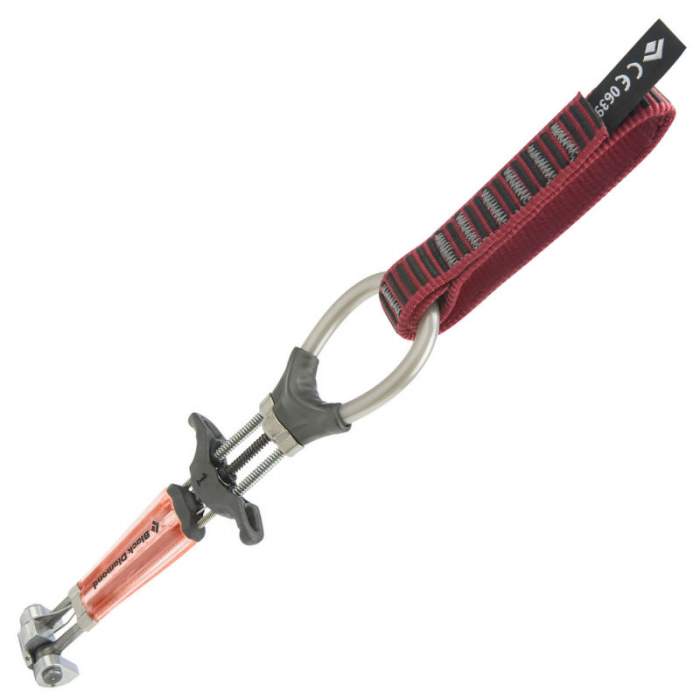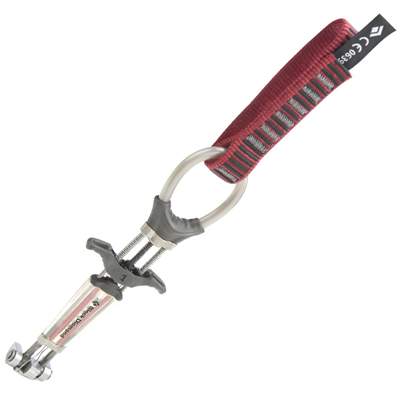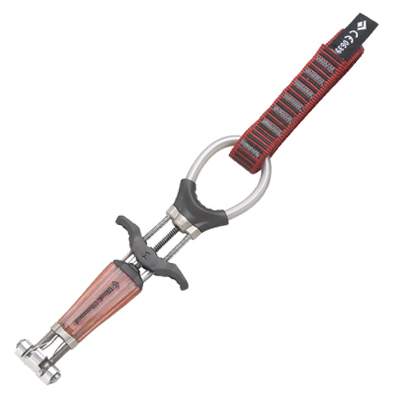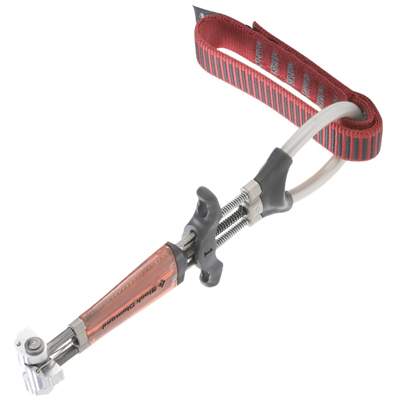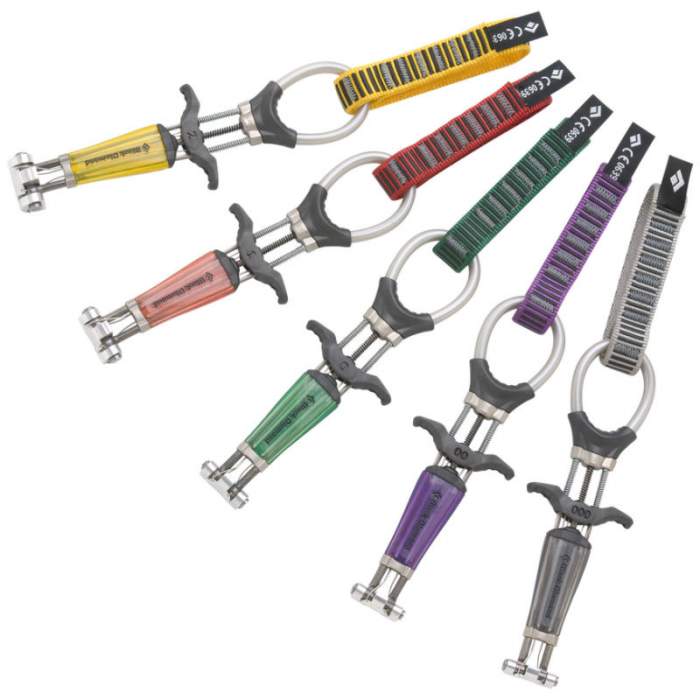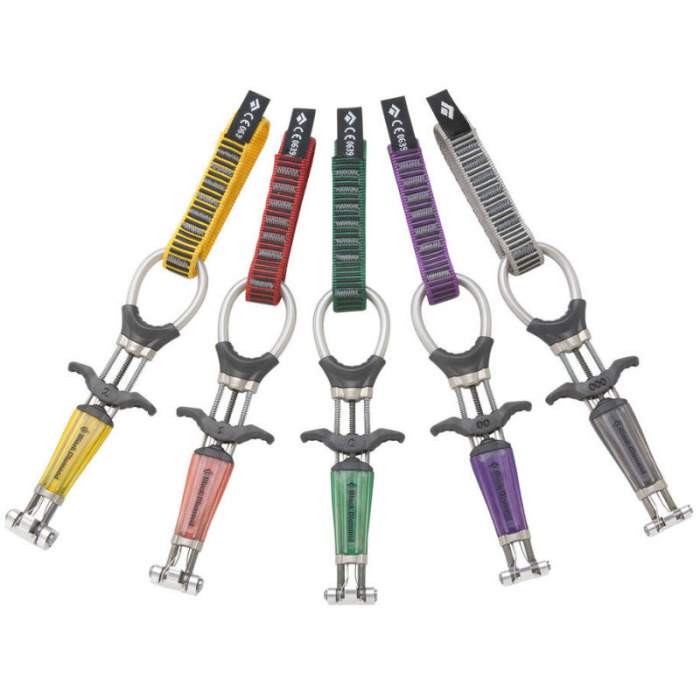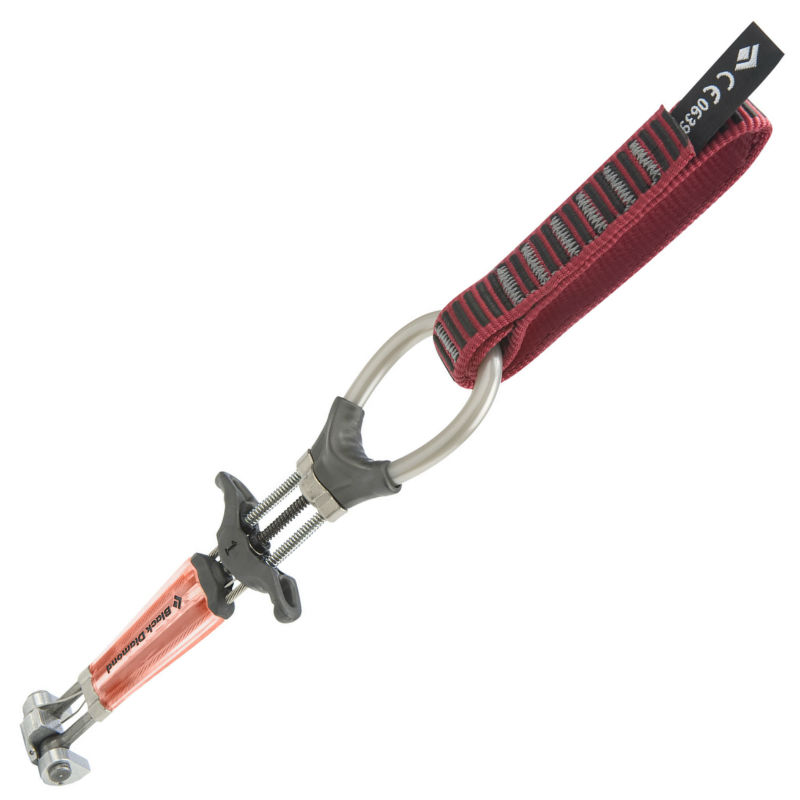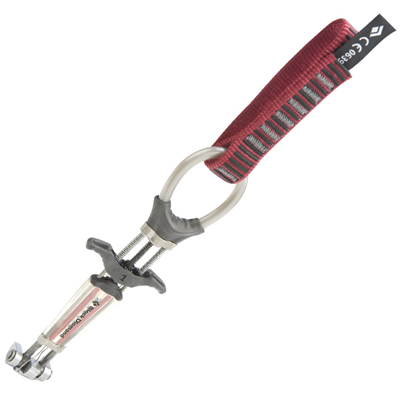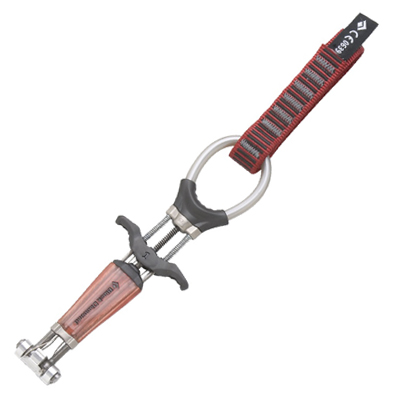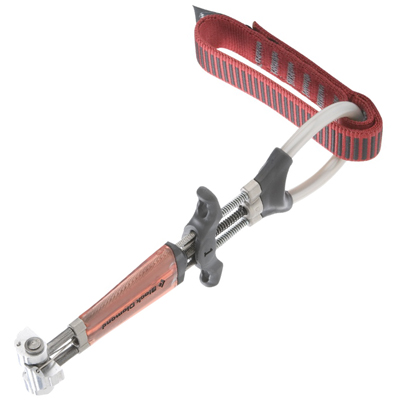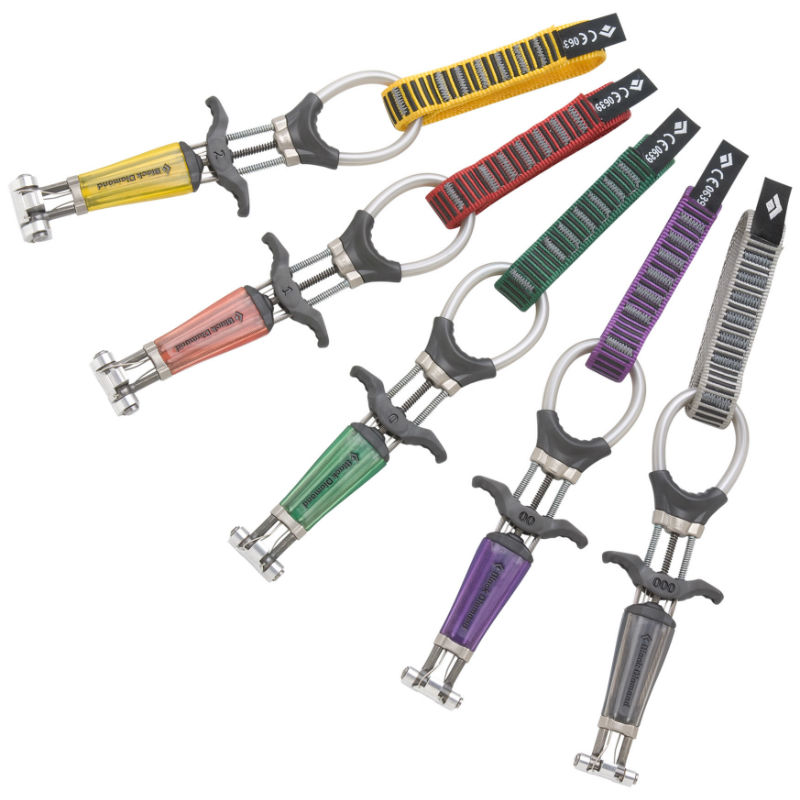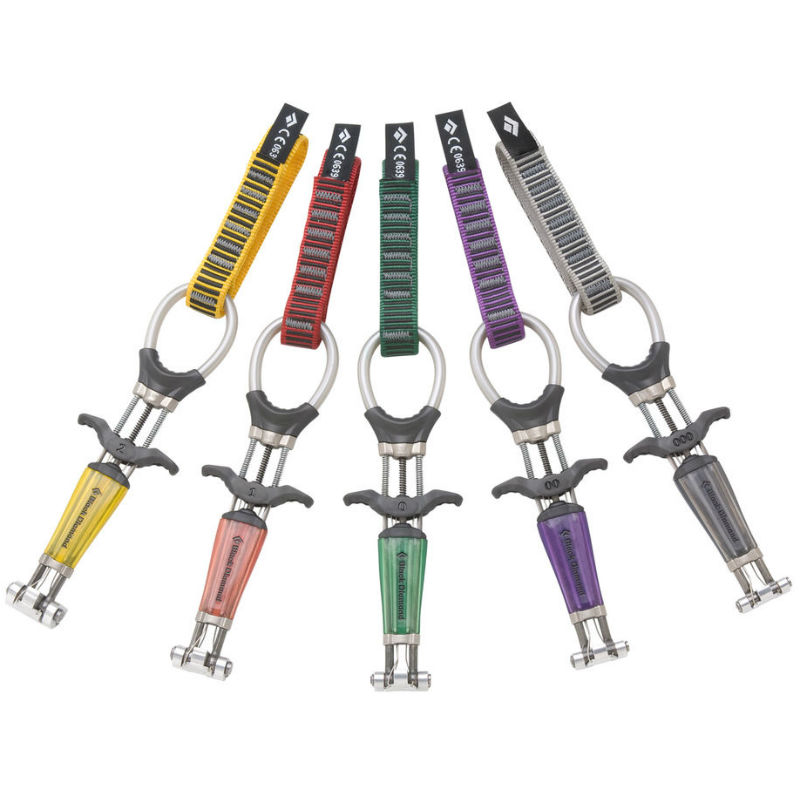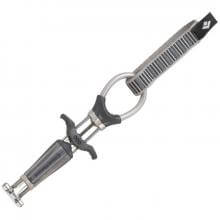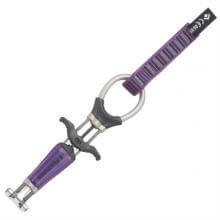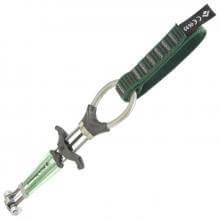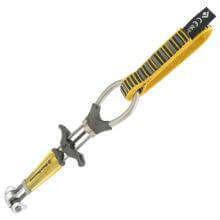Camalot C3 1
Description
From aid seams to tip cracks, the five sizes of Black Diamond Camalot C3s have you covered. With up to 30% less head width than any other micro cam, they fit in more places, more securely. Unique thin-profile stems are laterally stiff for slotting in tight placements, but flexible over edges for an evenly dispersed load.
• Heads are 30% narrower yet C3s are more secure, dependable and fit in more placements than other camming units
• Compression-spring driven with interlocking cam heads for bite in uneven cracks
• Flexible stem is laterally stiff for tight placements
• Color-coded for easy identification and wide range of sizes
Retail price
This Product is Hard to Find.
We don’t know where you can buy this item online in the US. We’ll continue to check all the major retailers and will update this page as soon as we find one.
If you know where to find this online in the US, let us know, and we’ll add the link.


Weight (g / oz)  Weight (g / oz)In grams and ounces, the weight, as stated by the manufacturer/brand. | 62.0 g / 2.19 oz |
| Cam Head | 3 lobes, single axle |
| Offset | No offset |
| Stem | Flexible double stem |
| Sling | Nylon / Polyamide (single sling loop) |
| Camming Angle | |
| Active Strength | 10 kN |
Cam Range (mm / in)  Cam Range (mm / in)In millimeters and inches, the maximum dimensions of the cam lobes when shut tight and fully extended. Since the "usable" range is so debatable, all manufacturers now list the full dimensions to avoid selling themselves short. For offset cams, we'll list the max dimensions possible and then afterwards list each of lobe dimensions. | 12.0 - 18.8 mm (0.47 - 0.74 in) |
| Materials | |
| Certification | CE, UIAA |
The Black Diamond Camalot C3 has the narrowest head by far, which makes it the best cam at getting in tight spots. It also goes down to a really small size, almost as small as as the Wild Country Zero. When you place a cam that small it can be scary to fall on. However, it is much better than no cam at all and many other cams won't get in spots so small. The stem is durable; you can bounce test these and contort them and they generally hold up well. The trigger is easy to use and has a nice big comfy spot for your hand. This is one of the easiest small cams to clean.
Camalots have steadily increased their following in the UK since they were redesigned a few years ago. Not a lot of people know this but, internally, a Camalot is a twin-stemmed device. The two sides of the stem are pinched together in the plastic sleeve and swaged into the head to give the handling of a single stem but the weight saving of a double stem. Camalots gain extra range from the double axle, and also by slightly increasing the camming angle of some sizes. In theory this will very slightly reduce holding power but, as Black Diamond point out, these are well tested units that certainly don't make a habit of coming out. Camalots are as lovely to use as they are beautifully built. I consistently got the right size first time, even though I am more used to other units, which is probably the extra range at work. There is precious little to fault and yet, somehow, I often found myself reaching for other units first. The springs felt a little less stiff than many others and the head of the unit just didn't sit quite as rock-steady as I clipped. The difference in holding power is probably negligible to non-existent but it did mean that the single axle units inspired me with a tiny bit more confidence. To cover a range from 19-100mm (actually 19.6-114.7mm) requires 6 units with a total weight of 984g.
The C4 is the backbone of my free climbing rack. They have wider cam lobes than Metolius and Alien cams in the smaller sizes, which means more surface area/friction. They can, however, be problematic in shallow, tapering, or irregular cracks, and they weigh more than the other options. For finger cracks, if I think I am going to fall on a small cam, I want it to be a C4. I have taken whippers on the blue .3 size, and these pieces are solid and confidence-inspiring. In the smaller sizes (0, 00, and 000), the C3 really shines. They are great for aiding thin seams; in fact, some folks successfully aid on these with only two lobes in contact with the rock, but I cannot personally vouch for that. I place small C3s occasionally on free climbs doubled up and equalized where there is no other option. They have a higher strength rating than Metolius cams, but I have never fallen on them. I like the design, but they are not very flexible, and sizes 1 and 2 do not seem to fit as well as the Metolius TCU equivalent.
Over Memorial day weekend in Zion, Lizzy really came to like the C3’s after taking her longest lead fall, 20 feet or more, on to a marginal green 0 C3. She was super happy that the cam held that real life test made her believe in the cams. One of our friends, Sara, also had a great experience with the purple 00 C3. I think the Green is also my favorite C3 and it got a lot of use on the SW face of Conness, fitting in one spot that was surely too narrow for any of our other small gear. Overall these cams are still working great after a year of use and always come along when thin gear is needed.
C3’s, made by Black Diamond, are a well polished three lobe camming unit. They have a plastic body that protects the springs and allows for each lobe to move independently. The smallest sizes, Grey 000, Purple, 00 and Green 0 fit in unique places and fill out the low end of our rack. The 0 is about the same size as a blue Alien / 0 TCU. I recently placed this piece on the crux pitch of cloud tower and it was bomber. The lobes sat nicely in the crack and the strong springs held it securely in place. Climbing the Vampire a month or so ago I had a stunning placement of the 00. It fit in a tiny crack and despite the small lobes it inspired confidence a rare thing for me when making such small placements.
Subjectively, the C3s feel good in the hand. The ribbed trigger and thumb rest are grippy and even the #000 fit my big mitts. The C3s were, the easiest to actually use. This makes them especially suited to free-climbing, where dinking around can make the difference between reaching the anchors, falling or yelling, "Take!"
Summary: Camalots are strong, versatile, and always reliable. Part of their high performance comes from the patented double-axle design, which lends extra strength, acts as cam stops, and gives these units the widest camming range on the market. However, the double axle makes each unit roughly 20 percent heavier than most other brands.
A large, textured thumb catch and trigger bar give slip-free placement and allow for independent cam manipulation. The large sizes have wide heads for exceptional stability in offwidths. The two smallest Micro Camalots, .1 and .2, lack double axles because of their small sizes, but have cam stops. The relative stiffness of the burly cables in these two sizes can make the .1 and .2 tricky to place in irregular slots or pods. The only other drawback is the price, which tops the charts.
Pros: Great trigger; long stem; double axle gives the best camming range in review; outstanding offwidth sizes; anodized heads; cam stops.
Cons: Heavy; expensive; smallest sizes tricky to place in irregular cracks.
Right now I have eight of these units on my rack. My bag is packed for a five-day adventure in my favorite part of my backyard: the Bugaboos. Hopefully tomorrow will be the day to send my ongoing project, and the C3s will be the key to protecting its tricky fingertip cruxes. I can't wait to be climbing above them again!
Pros: Great balance between stiffness and flexibility; easy to place; interlocking lobes offer a slim profile; stellar performance in winter conditions
Cons: Plastic sheath on the #000 can get in the way of a placement; stiff tension in the #2
This video is really long but very informative for the Camalots and Camalot C3's users.
Camalots are designed to provide protection across the full spectrum of crack sizes, from small incipient seams, to perfect hands, to full-on offwidths. Camalots, Camalot C3s, Camalot X4s and Camalot Ultralights each have their own unique advantages, and a well-rounded rack will likely contain some or all sizes of each cam. Check out the chart to see how the members of the Camalot family overlap.
How to use Black Diamond Camalot C3, care, maintenance, lifespan, inspection and retirement with instructional pictures.

